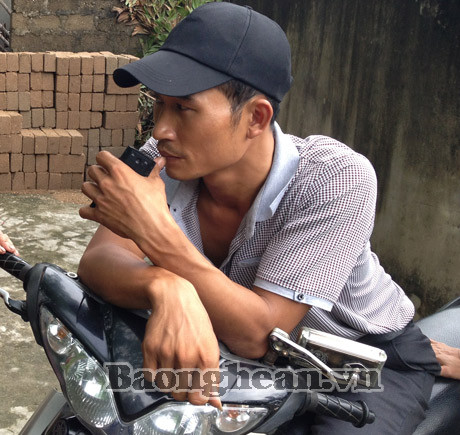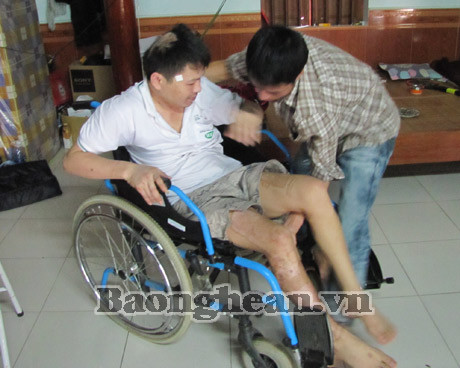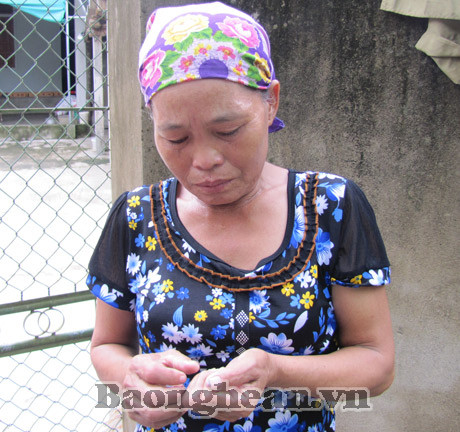Part 1: Tricks of fraud and robbery in hell on earth
A few years ago, when the labor export market to Korea was frozen, the Malaysian and Taiwanese markets had unstable incomes, and the Middle Eastern and West Asian countries had political instability, Angola was a paradise for Vietnamese workers. But now, this African country is becoming a hell on earth, where Vietnamese people are falling into a situation where they cannot bear to leave and cannot stay. Hell on earth
(Baonghean) -A few years ago, when the labor export market to Korea was frozen, the Malaysian and Taiwanese markets had unstable incomes, and the Middle Eastern and West Asian countries had political instability, Angola was a paradise for Vietnamese workers. But now, this African country is becoming a hell on earth, where Vietnamese people are in a situation where they cannot bear to leave or stay.
Hell on Earth
Sitting motionless on the bed, in a small house in Hoi 4 hamlet, Kim Lien commune, Nam Dan district, Nguyen Van Quyen (born in 1983) could not hold back his tears when talking about his days working in Angola - a place he called hell on earth. As a skilled and highly skilled mason, Quyen had worked as a construction worker in Saudi Arabia and had a little capital, which he brought back to renovate his mother's house. After finishing the house renovation, he ran out of money, so Quyen went to work as a mason but the salary was too low. In mid-2011, when Nam Dan district started a movement to export labor to Angola, Quyen was determined to borrow 7,000 USD, thanks to a contact in a neighboring commune to be able to go abroad to work with the promise of "a stable job, a monthly salary of about 1,000 USD".
At the end of November 2011, Quyen carried his luggage onto the plane with the hope of his brothers and relatives. After transiting in China, he arrived at the airport in the capital city of Luanda, Angola, with a jumble of thoughts. This country is too poor, desolate, the environment around the airport is smelly and dirty, how can he get a salary of 1000 USD. While he was lost in thought, a Vietnamese boss came to pick him up and took him to the camp. After testing his skills, Quyen was hired as a finishing worker for construction projects.
This is a harsh climate, sunny, windy, lacking clean water, workers are herded into a camp that is no different from a cowshed in the countryside. At night, the Vietnamese workers are arranged by the boss to sleep on a bed with a thin blanket, absolutely no mosquito net, mosquitoes are dense, buzzing like bees. For the first few days, the newcomers cannot sleep, but then the work is too hard, so as soon as they lay down, everyone sleeps like the dead.
Working about 9 hours a day in harsh weather conditions but being hard-working, patient and able to withstand high pressure and intensity of work, people like Mr. Quyen are not to be feared, but what they fear most is food and water. Usually, the boss will find the most clumsy person in the group of workers to assign the task of cooking.
The food is styrofoam boxes containing frozen chicken. After using a shovel to separate the ice and thaw the meat, the chef will pour it directly into a pot of boiling water, foam will float up and then scoop it out for the workers to dip in salt. The boiled water is used as soup, without any vegetable, onion, chili slices or any other spices. The chicken and soup are eaten with bowls of rice that are sometimes mushy, sometimes burnt, and cooked hastily. 7 days a week, 30 days a month, the workers are fed the same menu without complaining to anyone. In this country, clean water is more precious than gold. All year round, the workers are given by their boss to use cloudy yellow water pumped directly from the camps without any processing. Each small bottle of mineral water costs about 50,000 VND, very few people have the money to buy it.
In Angola, malaria has been raging for decades. Living in such a toxic environment, Vietnamese workers often get malaria. Le Van Hung, a close friend of Quyen who returned from Angola, said that when he first came to work, he got malaria three times. Whenever he felt feverish, the workers had to go to run an IV in a shabby medical station. Each time they got an IV, the workers had to pay 250-300 USD. If they didn't have the money, the boss would pay for them and deduct it from their salary. "Malaria is always a nightmare in Angola because there are a lot of mosquitoes that transmit diseases, the environment is dirty, and there is no clean water.

Mr. Le Van Hung, residing in Kim Lien commune, Nam Dan district, has just returned from hell on earth.
Most of the workers who died of malaria here were subjective, did not get IVs in time, and also because the IV fees were too expensive. Many people think that going to work abroad is fun, but after arriving in Angola, they realize that this is not a paradise to change their lives, a place where life and death depend on luck. Meals and sleep are not good, workers also have to worry about being robbed, being arrested by the police and deported back to their country," Mr. Hung shuddered as he recounted.
"Black banks" and the "brokers" trick of not paying
All Vietnamese workers who go to Angola illegally, through the illegal network of Vietnamese brokers. When arriving in Angola, there are 4 things that Vietnamese workers fear the most: being arrested by the police, malaria, being robbed and especially being cheated out of money by brokers. Brokers here are actually people who have worked in Angola for 5 to 10 years, some have become construction contractors, some have opened photo shops, photocopy shops, internet cafes, etc. When they see the high demand for labor in Angola, they return to Vietnam, sending people with a cost of 5,000 - 7,000 USD. After the workers arrive in the capital city of Luanda, the brokers will personally pick them up and take them to the camps, where they will begin to hand over the work.
Mr. Nguyen Dinh Minh, from Hung Nguyen district, currently working in the capital Luanda, said that the bosses' fraud and salary evasion happens all the time, but no one dares to react because the bosses are rich and have connections with the police. If they react, they will be immediately arrested and sent back to their country. Working with black bosses, they will be paid daily, 400 USD per day, but it is also very precarious. When they like it, the boss will pay, when they don't like it, the boss will stay silent. If they speak up and demand, they will be beaten and threatened to be killed. The scariest thing is when building houses for bosses with connections with the police (called Defa by the Vietnamese), when the house with a salary of several billion VND is about to be completed, the workers are both happy and sad, about to receive the few thousand USD in salary, but then they receive news that the police are chasing them. Without anyone telling them, everyone runs away in panic, not daring to think about money.
The phenomenon of Vietnamese contractors and brokers cheating and informing the police to arrest workers to avoid paying their wages is becoming more and more common. Vietnamese workers in Angola have set up groups and associations on the internet such as the Association of Vietnamese in Angola, the Association of those who have had their wages withheld, the Vietnamese Labor Community in Angola, etc. Through this, those in difficult and difficult situations will receive help from the community. They also inform each other about Defa's arrests in the areas to warn workers to be careful, and they expose the fraudulent practices of some bosses. Despite the difficulties, the spirit of mutual love of Vietnamese workers still shines brightly in the poor land of Africa. Whenever a Vietnamese person dies or is seriously injured, the workers here do not hesitate to contribute money to help them go to the hospital for treatment, help relatives pay for tickets, funerals, and coffins for hospitals. For each death case in Angola, it usually costs between 50,000 and 100,000 USD to bring the victim back to the country, most of which is due to the help and intervention of the Embassy and donations and support from the community. |
In early 2012, from Nghi Xuan commune, Nghi Loc district, two workers Nguyen Phuc Tung (born in 1991) and Nguyen Van Tung (born in 1983) eagerly paid 6,500 USD to fly to Angola, with a promised salary of 1,000 USD/month. After working for 3 months, the contractor owed them their salary and promised to pay them all after completing the project. When the project was just finished, the group was eagerly receiving the money when a Defa group appeared and took them to the police station... After being arrested many times and having their money swindled, the Vietnamese workers realized that the fact that they were arrested by Defa was actually due to the Vietnamese brokers and bosses who informed them to swindle the workers' money.
Not being cheated out of their wages in Angola was a blessing, but after receiving their wages, they had a hard time sending money home because robberies were a daily occurrence. Usually, every afternoon when they received their wages, a group of black men armed with guns would come to rob them of their money, and if anyone resisted, they would be shot dead. After being robbed many times, the workers found out that it was all because of the Vietnamese brokers and bosses.
If you don’t want to be robbed, the only way is to ask a broker to transfer money to Vietnam through a “black bank”. Every time you transfer 1,000 USD, the broker will charge you a fee of 100-150 USD. “After receiving the money, the broker will call Vietnam and someone will deliver the money to the worker’s family, very quickly but with a sky-high fee. “When I was in the prison camp in the capital Luanda, my wife at home had to send money to do the procedures to return home and was also charged by the broker. Only the workers are suffering, but the brokers are taking all kinds of money from the miserable people”, said Tran Van Hung (born in 1970), who just returned from Angola.
Witnessing the fraud and robbery in the "promised land" Angola, Nguyen Van Quyen was determined to earn enough capital to return home. At the end of 2012, while working on scaffolding, Quyen got tangled in an electric wire, fell to the ground, and his skin was burned. Friends and the Vietnamese community in Angola had to take him to the emergency room at a private hospital in the capital Luanda, where he stayed for 2 days at a cost of 18,000 USD. Out of money, Quyen was taken to the Burn Institute for treatment. His mother had to mortgage her house and borrow from the bank to send 9,000 USD to her friends to take him back to Vietnam.

Mr. Nguyen Van Quyen returned in a wheelchair.
Mrs. Nhung, Mr. Quyen's mother, cried when talking about her son.
Returning home, after 2 months of treatment at the National Burn Institute, Mr. Quyen was paralyzed on one side of his body, his head was dented, and he had to accept living his life in a wheelchair... Not long after Mr. Quyen returned, his friends and hundreds of other Vietnamese workers also began to flee.
(To be continued)
Nguyen Khoa






